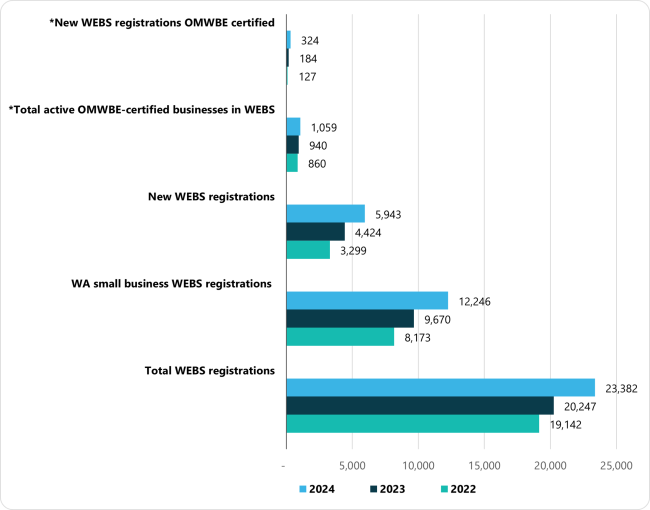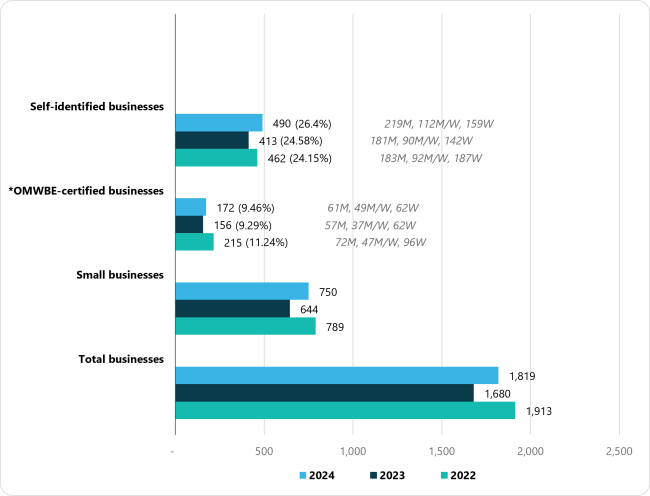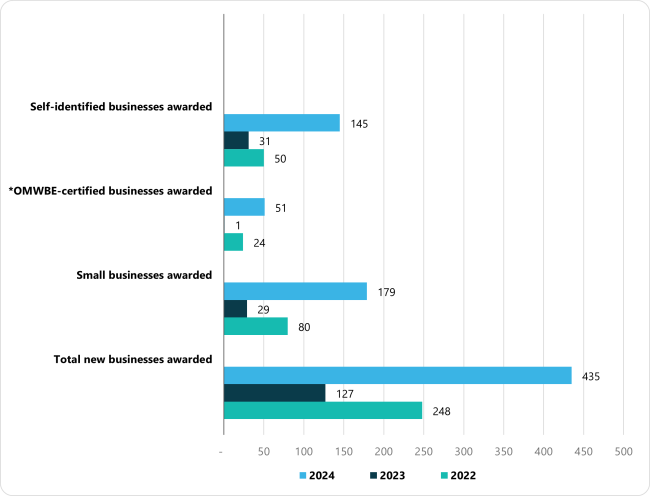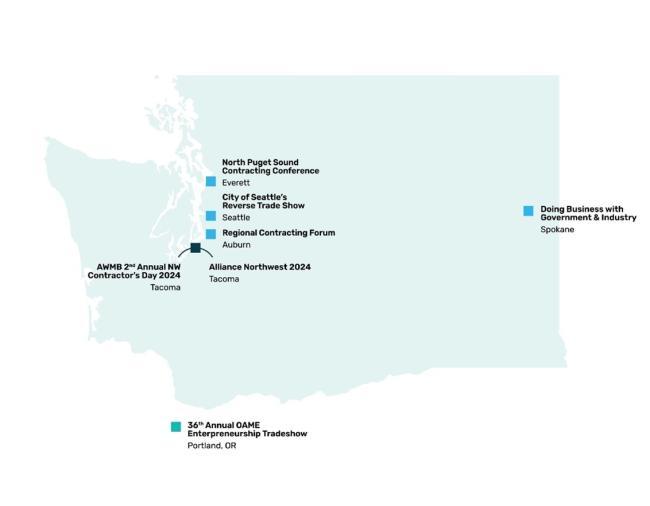DES oversees statewide contracts for goods and services used by all state agencies, as well as the state’s electronic vendor registration system called Washington's Electronic Business Solution (WEBS).
We're working to:
- Boost availability of small businesses in WEBS.
- Increase the number of small, diverse, and veteran businesses on statewide contracts.
- Help businesses find opportunities to bid on statewide contracts.
Boost availability of small businesses in WEBS
RCW 43.19.725 requires DES to focus on increasing the number of small businesses registered in Washington’s Electronic Business Solution (WEBS), the state’s enterprise vendor registration and bid notification system. DES does this by providing technical assistance through partnerships with grassroots organizations that can reach small and diverse businesses selling what the state is buying and working with these partners to get businesses registered in WEBS. Learn more about state purchasing from small businesses.
*DES does not certify women- and minority-owned businesses. However, we do monitor how many certified businesses register in WEBS.
Increase small and diverse businesses on statewide contracts
Under DES-090-06 agencies are required to take specific steps to ensure they give Washington state small, diverse, and veteran-owned businesses equitable access to goods and services contracts. One area of focus for DES is increasing the number of small businesses available on the statewide contracts that all agencies use. Spending on statewide contracts makes up about 14% of overall state agency spending . DES unbundles all new and renewed statewide contracts to the extent possible. Breaking larger contracts into smaller portions promotes opportunities for small and diverse businesses. In Fiscal Year 2024, 45 statewide contracts were put in place , and all of them were unbundled. DES also works with partner organizations to help small businesses learn how to bid with the state, and posts bidding opportunities 12 months in advance.
Active businesses on statewide contracts by fiscal year
Newly awarded businesses on statewide contracts by fiscal year
Businesses notified of opportunities to bid on statewide contracts
In fiscal year 2024 (July 1, 2023 – June 30, 2024) DES put 45 statewide contracts in place with 435 businesses awarded to the contracts.
- 6,360 small businesses were notified of bidding opportunities.
- 945 were OMWBE certified.
- 253 OMWBE-certified businesses downloaded bidding opportunities.
- A total of 323 businesses bid
- 213 were small businesses
- 89 were OMWBE certified
DES activities are designed to support building availability of small and diverse businesses who are equipped and available to do business with the state. Focus areas include:
- Connecting with the community.
- Building capacity.
- Supporting agencies in applying supplier diversity best practices.
Connecting with community
Objectives:
- Help DES better connect with small and diverse business communities and build a better pipeline of businesses available for statewide contracts.
- Gain input and recommendations from small and diverse businesses on ways to reduce barriers to participate in state goods and services contracts.
DES Business Diversity Advisory Group (BDAG)
Goal: Prioritize 40 BDAG recommendations, include top 3 in the PIE strategic plan:
Results FY 24: The following items are in the PIE strategic plan
- Improve transparency and eliminate bias in bid evaluations
- Priority points for micro and mini-businesses
- Help to bring value to the OMWBE certification
Learn more about BDAG activities.
DES State Contracts Assistance Network (SCAN)
Goal: Establish network and form at least 30 partnerships.
Results FY 24: 33 partnerships formed
Learn more about the SCAN network.
Business diversity updates bulletin (monthly newsletter)
Goal: Grow subscribers, achieve above average engagements.
Results FY 24:
- Subscriber growth: 1,159-2,288. Started bulletin in August 2022 with 32 subscribers.
- Engagement rate: 41% (above average rate of 18.6%).
Broaden our reach to the business community
Goal: Leverage partnerships to achieve broader reach
Results FY 24:
- Contributed monthly to OMWBE Supplier Diversity Newsletter and ORIA Economic Resilience Newsletter. Through these contributions we reach more than 500,000 subscribers.
- Notify SCAN partners and do outreach through BDAG about opportunities on statewide contracts in addition to WEBS notifications, who in turn distribute this information via their respective newsletters and social networking systems.
Building capacity
Objective: Provide information to small and diverse businesses who may want to work with the state
Goal: DES Procurement Inclusion and Equity Program connects with goods and services businesses through events and outreach.
Results FY 24:
- Attended 152 events and presented at 73.
- 34 Community Engagements
- 29 General Partner’s Meetings (e.g. Tabor, NAMC, Black Collective)
- 45 Networking Events
- 22 Technical Assistance Events
- 22 Agency Program Events
Language/Bilingual Events
Goal: Share information on upcoming public works contracting and training opportunities across the state:
Results FY 24 – events in Eastern and Western Washington as well as Oregon.
Supporting agencies in applying supplier diversity best practices
Objective: Support agencies in implementing Enterprise Supplier Diversity Policy practices and find small and diverse businesses on statewide contracts
Community of Practice
Goal: Form community of practice, with primary focus on agencies with more than $100M in spend
Results FY 24:
- Community of Practice membership growth: from 20 to 260.
- Representation
- All 28 state agencies that spend more than $100 million
- 7 higher education institutions/political subdivisions
- 43 executive branch agencies, 10 other types of members
- Average monthly meeting attendance: 72
Contracts Connection newsletter
Goal: increase subscribers and engagement
Results FY 24:
- Subscriber rate has grown from 16,205 in FY23 to 19,510 in FY24
- Engagement: 32% (above the average rate of 18.6%).
Terms used
- Community of practice – A group set up to share knowledge, reinforce best practices and learn from one another.
- Fiscal year (FY) – Washington state’s fiscal year runs from July 1 to June 30 every year. The fiscal year is named after the year in which it ends (e.g., fiscal year 2023 is from July 1, 2022, to June 30, 2023).
- OMWBE certified – A business certified by the Office of Minority and Women’s Business Enterprises. OMWBE certifies small businesses owned and controlled by minority, women, and socially and economically disadvantaged persons.
- Registered in WEBS – The number of businesses registered in the state’s online businesses notification system called Washington’s Electronic Business Solutions (WEBS). Businesses register in WEBS to receive notice of bidding opportunities.
- Self-identified minority – A business that has identified itself as minority owned in the WEBS system.
- Small business – A business that has self-certified in WEBS that it qualifies as a small business under RCW 39.26.010 or a business that is OMWBE-certified.
- Spending on statewide contracts – Calculated based on 2019 Washington State Disparity Study data.
- Statewide contracts – Contracts competitively bid by DES that all state agencies use. Agencies, other government entities like cities and towns and tribes can purchase directly from the contracts. These contracts generally make up about 14% of state agency spending.
- Unbundling – Breaking a large contract into smaller components. Breaking larger contracts into smaller portions promotes opportunities for small, diverse, and veteran businesses and can raise their participation.
- Veteran certified – A business certified by the state Department of Veteran Affairs as veteran-owned.



